Introduction:
A person should refrain from inserting anything into the vagina for approximately six weeks following a hysterectomy. However, sex normally does not change after a hysterectomy once the body has healed.
Some people may even find that having a hysterectomy improves sex, depending on why they had one.
However, some people do have negative effects. For instance, if the ovaries are also removed during surgery, the sex drive may be impacted by shifting hormone levels. But if these consequences do happen, there are techniques to manage them.
A person’s body’s healing time following a hysterectomy will determine how long they must refrain from having intercourse. When to restart sexual activity is a decision that a doctor can make.
A complete used to be the sole option available to women. Nowadays, unless there is no other choice, it is rarely done. This leads to most women not thinking about the impact of having sex following a hysterectomy.
Even if they do, the life-or-death scenario that compels them to have the most likely outweighs any potential negative consequences for their sexual lives.
However, whether you are undergoing or recovering from a total hysterectomy, this process doesn’t have to be frightening or isolating. Women no longer have to keep these things to themselves or be scared to discuss them.
What Is A Hysterectomy?
Surgery to remove your uterus and, most likely, your cervix is called a hysterectomy. Depending on the purpose of the procedure, may entail the removal of surrounding tissues and organs, such as your ovaries and fallopian tubes.
A will prevent you from becoming pregnant and from experiencing your menstrual cycle.
In the US, this is the second most common procedure performed on women. It can be used to treat endometriosis, cancer, and uncomfortable uterine fibroids, among other illnesses. The surgeon may remove the ovaries and fallopian tubes, among other reproductive organs, according to the patient’s medical needs.
In the past, having a meant undergoing open surgery, which involved a lengthy recuperation period and a big abdominal incision to remove the uterus.
Many cases now include minimally invasive surgery, such as robotic hysterectomy, in place of open surgery. Because this kind of surgery only involves a few tiny incisions, there is less discomfort and bleeding, a quicker healing period, and less scarring.
How Long Is It Safe To Have Sex After A Hysterectomy?
After having a hysterectomy, women should avoid vaginal insertions for 6–8 weeks. This contains tampons, douches, sex toys, fingers, and a penis.
For a few weeks following surgery, you can have some vaginal bleeding or soreness. Also, your feelings about sex or yourself could change.
- If you need time to grieve, do so.
- Get over any feelings of shame you may have about having a hysterectomy.
- Recognize that you did not cause a hysterectomy.
- Acknowledge that the absence of your ovaries and uterus does not diminish your femininity.
How Does A Hysterectomy Affect Sex?
You should not have a difference in the quality or ability to have sex following a hysterectomy.
- Your sex hormone levels will fluctuate, which will impact your desire for sex.
- Menopause will occur sooner if the uterus is removed, which will reduce enjoyment.
- If the uterus and cervix are removed, your orgasms will be different.
- A will reduce the size of the vagina, which will impede penetration.
The notions are false because they are myths. Furthermore, these are not the results of a hysterectomy. Your capacity to enjoy or have sex is usually unaffected by the physical changes that take place in the body.
After having, many women report having better sex. Sex improves after because many patients experience pain from the underlying issue that prompted them to seek surgery. When they are not experiencing severe menstrual flow, some people report having better orgasms and far more fulfilling sex lives. In certain situations, having intercourse might be enhanced by the sense of liberation that comes with no longer being able to conceive.
Can A Woman Engage In Sexual Activity Without A Uterus?
Although certain alterations in the pelvic region may result from a hysterectomy, sexual pleasure is typically unaffected. Most women who recover from a can resume having healthy, satisfying sexual lives.
Sex without a Cervix
For the majority of women, orgasm and vaginal feeling should not be impacted by a total hysterectomy. Even with the uterus and cervix gone, sex is still enjoyable. The vagina may occasionally be a little shorter following surgery, but this shouldn’t interfere with sexual activities.
There shouldn’t be any bleeding or pain during post-hysterectomy intercourse if you’ve had enough time to recover.
Can a Hysterectomy Prevent Sexual Intercourse?
Due to the removal of your ovaries after a total hysterectomy, you are no longer able to produce progesterone or estrogen. Due to the same kind of hormone deficiency occurring in both situations, the symptoms you can have are comparable to those of menopause. Experiencing menopause symptoms for the first time can leave you feeling overwhelmed.
- Hot Flashes
- Night Sweats
- Anxiety
- Weight Gain
- Depression
- Low Libido
- Insomnia
- Fatigue
- Mood Swings
- Vaginal Dryness
- Thinning Of Vaginal Tissue
It makes sense that these symptoms, especially the alterations to your vagina and sexual drive, could have an impact on your sexual life. Sexual discomfort can be caused by both dry vaginal tissue and thinning vaginal tissue.
Your urge to initiate or have sex is impacted by a decreased sex drive, which also correlates with poor energy levels that keep you dragging along.
Describe the Many Types of Hysterectomy
The sort of hysterectomy you require will be discussed by your healthcare professional based on your situation. This will establish whether they also need to remove your ovaries and/or fallopian tubes.
- Whole Hysterectomy
Removing your cervix and uterus while leaving your ovaries intact. You won’t go into menopause right away following surgery because your ovaries are still there.
- Removal of the supracervical region
Only removing the top portion of your uterus while keeping your cervix intact. Additionally, you might have both your ovaries and fallopian tubes removed simultaneously. You’ll still require Pap smears because your cervix is still present.
- Combined with bilateral salpingo-oophorectomy
Removing your fallopian tubes, ovaries, uterus, and cervix. If your ovaries are removed, menopause will begin right away.
- Combined with bilateral salpingo-oophorectomy
The removal of your ovaries, fallopian tubes, uterus, cervix, upper vaginal region, and some surrounding tissue and lymph nodes. The most frequent usage of this type by providers is in cases of cancer. After this type, you will experience menopause since your ovaries will no longer be functioning.
How Does Sex Alter After A Hysterectomy?
While having a hysterectomy alters a person’s capacity to conceive, it typically has little effect on sexual pleasure. After recovering, people can frequently resume having satisfying, healthy sex.
Revealed three and twelve months following a hysterectomy, individuals’ assessments of sexual function improved.

- Decreased Discomfort or Pain
Many symptoms that made sex uncomfortable before surgery, like pain or excessive bleeding, may be alleviated by a hysterectomy. When these symptoms are reduced, having sex after a hysterectomy may be more pleasurable than it was before the procedure.
- Same Feeling
Therefore, sex should continue to feel the same as it did before the procedure.
- Vagina Lengthening
Depending on the surgery type, the vagina may be a little shorter than it was before the hysterectomy.
One should not have discomfort or bleeding as long as they have had enough time to recover. Speak with a doctor if you have any pain or bleeding during intercourse.
How Your Sexual Life Is Affected By a Hysterectomy
Because a hysterectomy eliminates pain during sexual activity, some women may experience an improvement in their sexual lives. Others may find sex challenging at first due to the emotional toll. Both of these experiences, as well as anything in between, are entirely typical.
You should have an honest conversation with your gynecologist about the private parts of sex. You’ll feel less anxious about the procedure if you know exactly what to anticipate.
Sex may be liberating in addition to more enjoyable sexual encounters, particularly regarding birth control. In addition to improving your capacity for orgasm, the sensations will probably enhance if you stop using hormonal birth control or have sex without a condom.
How Soon After A Hysterectomy Can You Have Sex?
The majority of physicians advise delaying sexual activity for six weeks following surgery. In addition to giving your body more time to heal, this lowers your risk of infection. Even now, there is a slight risk of bleeding following sexual activity. Talk to your doctor about any surgical problems if this happens.
You should refrain from more than simply sexual activity after a hysterectomy. Avoid inserting anything in your vagina, including tampons, sex toys, and fingers, according to medical professionals. Patients who have had a vaginal may experience vaginal discharge and bleeding following the treatment. Avoid the temptation to absorb this using tampons and use pads instead. Follow your doctor’s aftercare instructions in the letter.
Handling Modifications in Sexual Function Following a Hysterectomy
Although having sex after a may seem overwhelming, many women report that their sexual function has improved or remained unchanged after the procedure. Every woman’s journey is different, though. Some may suffer from alterations in sexual feelings, pelvic floor weakness, and dry vagina. The right care is given to manage these symptoms.
Your body undergoes major changes. Understanding these changes is the first step toward having a fulfilling post-operative sexual life.
Even in cases where the ovaries are retained, potential nerve damage, alterations in the blood flow, and the lack of uterine contractions can occasionally modify orgasm after a hysterectomy. Some women may have an increase in the frequency of orgasms after surgery, and the quality and intensity of orgasms should not be permanently blocked.
What Is The Purpose Of A Hysterectomy?
Before prescribing, doctors frequently try other therapies. This primarily relies on the cause of the hysterectomy. Sometimes, surgery is the only way to address the problem, or those treatments don’t work.
- Excessive or abnormal vaginal bleeding.
- Intense pain in the pelvis.
- Tumors that are not malignant, such as uterine fibroids.
- Extremely bad endometriosis.
- Incontinence of the feces or urine may result from uterine prolapse.
- Uterine, ovarian, or cervical cancer.
- Conditions like adenomyosis or hyperplasia can affect the lining of your uterus.
- Severe birth problems, such as ruptured uterus.
To prevent cancer, many patients get a hysterectomy. Removing the uterus can lower the risk of certain cancers in those who are at high risk for them.
In What Ways May I Get Ready For A Hysterectomy?
A medical professional will go over the process in detail, including any potential side effects and difficulties. Samples of your blood and urine can be required to ensure that you are healthy enough for surgery.
Depending on the procedure your surgeon employs and the type of hysterectomy you undergo, you might not need to stay in the hospital. Talk about the kind of support you will require in the initial stages of your recuperation so that you can make arrangements for assistance.
How Does A Hysterectomy Proceed?
Your doctor will decide what kind of hysterectomy you require and the most effective surgical technique to carry it out. You’ll put on a hospital gown and be connected to heart-rate monitoring devices. An intravenous (IV) line will be inserted into a vein in your arm by a medical professional to administer fluids and drugs.
During the surgery, you will be put to sleep using general anesthesia.
Regional anesthesia is the process of administering medicine close to your lower back’s nerves to “block” pain while you remain conscious. It is less frequent.
How Does A Hysterectomy Go?
- During Surgery
Usually, either spinal anesthesia or general anesthesia is used for the procedure.
In certain instances, the cervix might also be removed. Most of the time, all of the sutures are absorbable.
- After surgery
Typically, patients are given antibiotics and painkillers and released 24 to 48 hours following surgery.
For a few days to weeks following surgery, you can have bloody vaginal discharge and need to wear sanitary pads. A full recovery could take six to eight weeks. In comparison to abdominal hysterectomy, vaginal hysterectomy typically has a shorter and less painful recovery phase.
Additionally, your doctor may recommend that you refrain from strenuous exercise and heavy lifting for a maximum of six weeks. For the first six weeks following surgery, surgeons advise against performing any vaginal insertions. For this reason, having intercourse within the first 6–8 weeks following surgery is not advised.
How Much Time Is Needed For A Hysterectomy?
It takes one to three hours to complete. The time may change based on:
- How big is your uterus?
- If there is scar tissue from previous procedures.
- Whether your surgeon needs to remove other organs or endometriosis.
The Schedule for Sexual Activity Following a Hysterectomy
It’s normal to worry when having sex again after a hysterectomy is safe. After six weeks, or when you feel like you’ve healed, you might appreciate other types of closeness. You should only resume sexual activity when you are completely ready, though, as healing rates vary from person to person.
Only until the incisions have healed enough and all vaginal discharge associated with the procedure has stopped could sexual activity, including sexual intercourse, be considered. When you and your partner resume sexual activity, make it important to communicate openly and begin softly, paying close attention to any pain.
Following the advised waiting period, it is advised to consult a doctor if any pain or bleeding happens during intercourse.
There should be no impact on the capacity to experience an orgasm.
The vaginal sensation ought to stay constant.
You should discuss sexual drive with your doctor because hormonal changes brought on by ovary removal may impact it.
How Sexual Function May Be Affected by a Hysterectomy
- Physical Effects
- Uterine Loss
The removal of the uterus usually does not affect the ability to orgasm because it has no direct involvement in sexual pleasure. However, because of alterations in vaginal depth and sensation, some patients report feeling physically different following the procedure.
- Vaginal Alterations
Some people report changes in vaginal length or tightness after cervix removal, which may impact how it feels to have sex. The sensation of the vaginal cuff may vary in certain situations.
- Ovarian Function
Menopause, or surgical menopause, can result from removing the ovaries during the process. This can cause symptoms like changes in sexual desire, lower libido, and dry vagina. Intercourse may become unpleasant as a result of decreased lubrication caused by a decline in estrogen levels. Hormone replacement treatment (HRT) could lessen these side effects.
- Pelvic Floor Changes
Sometimes the pelvic floor muscles are impacted by uterine loss, which can alter vaginal tone and control and impact sexual function and enjoyment.
- Impact on Emotion and Psychology
- Self-Esteem And Body Image
Losing the uterus can cause feelings of loss or grieving, or it might have an impact on a person’s body image. Intimacy and sexual desire may be affected by these emotional shifts.
- Pain Alleviation
Some people who had a hysterectomy for illnesses like cancer, fibroids, or endometriosis may find that their heavy bleeding or chronic pelvic pain has decreased, which could enhance their overall sexual experience.
- Effect On Emotions
Sexual health may be impacted by the surgical procedure’s psychological repercussions. While some people may suffer anxiety or despair, which can result in decreased sexual attraction, others may feel empowered or relieved.
- Effect on Sexual Desire
It can have different effects on sexual desire. Some people report feeling less libido, particularly if they have had their ovaries removed, which can cause hormonal abnormalities. Others may feel more sexually inclined as a result of the alleviation of pain or discomfort related to specific gynecological diseases.
Hormonal therapies, such as hormone replacement therapy, can assist people who have hormonal alterations following surgery to regain their libido.
- Recuperation and Resumption after Surgery
To give the body time to heal, most patients are recommended to avoid sexual activity for 6 to 8 weeks following surgery, however, recovery times vary. While others may need to adapt or try different forms of closeness, many can resume sexual activity after recovery.
Lubricants, vaginal moisturizers, or pelvic floor exercises may be helpful if there are vaginal alterations.
- Talking to the Partner
It’s important to communicate openly with your partner. It is possible to enhance the sexual experience after a hysterectomy by talking about feelings, worries, and any discomforts.
- Things to Think About
Problems with Infection or Healing: Issues with the vaginal cuff or infections can occasionally arise and may momentarily interfere with sexual activity.
Nerve Damage: While uncommon, nerve damage sustained during surgery may have an impact on sexual arousal.
Following a hysterectomy, what happens?
Your length of stay in the hospital after a hysterectomy will vary based on the type of surgery you have. You may be monitored by your healthcare practitioner to make sure there are no indications of problems. To avoid blood clots in your legs, you will be walking around as soon as possible following surgery.
Hysterectomies performed vaginally or laparoscopically are less intrusive and usually don’t necessitate an overnight hospital stay.
If you have any worries about the surgery or your recuperation, make sure to address them before you leave for home.
Sexual Advice Following a Hysterectomy
To make it easier, one can perform several things,
- Not Rushing Things
Sexual activity too soon after surgery can result in pain or infection. The doctor’s advice regarding when it’s safe to have sex should be followed; keep in mind that six weeks is merely a recommendation. Certain individuals might not be prepared at that stage of their recuperation.
- Speaking With Their Significant Other
It’s crucial to discuss how any sexual partners are feeling following a hysterectomy, particularly if there is any pain or discomfort.
- Putting lubricant on
Sex may be easier and more pleasurable if lubricant is used. Those undergoing surgical menopause may find lubrication particularly beneficial.
- Trying out various positions
Some postures may be more comfortable than others, particularly for those who are suffering from dry vaginas. They might try out several positions in these situations to see which one feels the best.
Other Hysterectomy-Related Issues
Although hysterectomies are among the safest surgical procedures, there are hazards associated with all surgeries. The following are some more possible hysterectomy side effects that could impact sex:

- Pelvic Floor Weakness
The inability of the muscles that support the organs inside the pelvis to relax and contract normally is known as pelvic floor sexual dysfunction, and it can have an impact on bowel and urine movements as well as sexual function.
It is debatable if hysterectomies and pelvic floor dysfunction are related. Overall pelvic floor function is improved six months following a variety of hysterectomies.
But according to some researchers, there is a connection. According to the researchers, nerve injury sustained during the procedure can be the cause of the connection.
There is currently no solid evidence linking pelvic floor dysfunction to hysterectomies. To determine if hysterectomies can have this effect and, if so, the potential risk, more research is required.
Following surgery, performing pelvic floor exercises like Kegels can help strengthen the muscles in the area.
- Sexual Arousal
Following a hysterectomy, some people report feeling less sensation inside their vagina during intercourse. However, this should not have an impact on the clitoris, therefore it does not necessarily impede orgasms.
However, variations in vaginal feeling may influence the sex positions or methods that are comfortable.
- Pain during Sex
Some hysterectomy patients have pain during sexual activity. This might improve over time, but it might be permanent for some people.
One possible explanation, according to some research, is vaginal shortening. In certain hysterectomy types, this could occur more frequently than in others.
However, researchers are still figuring out what can hurt following a hysterectomy.
Strategies for Enhancing Sex Following a Hysterectomy
There are several strategies to combat depression symptoms, poor libido, and melancholy following a hysterectomy. The natural method to improve your mood is to eat well and exercise frequently. You’ll probably heal more quickly and feel better about yourself, which will make you want to be physically intimate.
When having sex after a hysterectomy, utilize personal lubricants if you have had vaginal dryness. To improve your sexual experience if surgery has damaged your pelvic floor, try Kegel exercises and other core-building activities.
But everyone recovers at a different rate and in a different way. For a while following a hysterectomy, people must refrain from putting anything into the vagina. In certain cases, sex may also be impacted by hormonal or emotional changes.
Medypharmacy can help if you have trouble adjusting to changes in your sexual life following a hysterectomy or if you have more questions. Our approach to healthcare is caring and comprehensive.
























